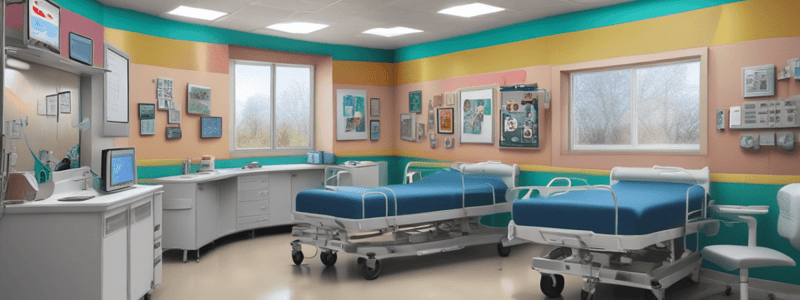Podcast
Questions and Answers
What type of patients are typically involved in inter-facility transports?
What type of patients are typically involved in inter-facility transports?
Why is it important to know the locations and transport protocols of specialty centers?
Why is it important to know the locations and transport protocols of specialty centers?
What is crucial for providers to obtain during ambulance transport?
What is crucial for providers to obtain during ambulance transport?
What is a key aspect of hospital staff familiarity mentioned in the text?
What is a key aspect of hospital staff familiarity mentioned in the text?
What type of cooperation is deemed essential for the best patient care outcomes according to the text?
What type of cooperation is deemed essential for the best patient care outcomes according to the text?
Which type of centers are equipped to handle traumas, burns, psychiatrics, and specific patient care?
Which type of centers are equipped to handle traumas, burns, psychiatrics, and specific patient care?
Flashcards are hidden until you start studying
Study Notes
- Specialty centers are equipped to handle traumas, burns, psychiatrics, and specific patient care, with in-house staff and surgeons.
- Specialty centers may have longer transport times but offer definitive care quickly, making it important to know their locations and transport protocols.
- Local specialty centers include stroke centers at Richland Baptist, Lexington, heart centers at Richland, Lexington, MUSC downtown, and trauma centers at Richland and Lexington.
- Inter-facility transports involve transporting non-ambulatory patients or those with acute medical conditions between facilities, requiring medical monitoring.
- During ambulance transport, it is essential for providers to obtain patient medical history, vital signs, and conduct ongoing patient assessments.
- Hospital staff familiarity, including functions, limitations, communication, and interacting with different roles like providers, registration, and attending staff, is crucial.
- Cooperation among EMS, first responders, law enforcement, firefighters, and other agencies is essential for the best patient care outcomes.
Studying That Suits You
Use AI to generate personalized quizzes and flashcards to suit your learning preferences.




